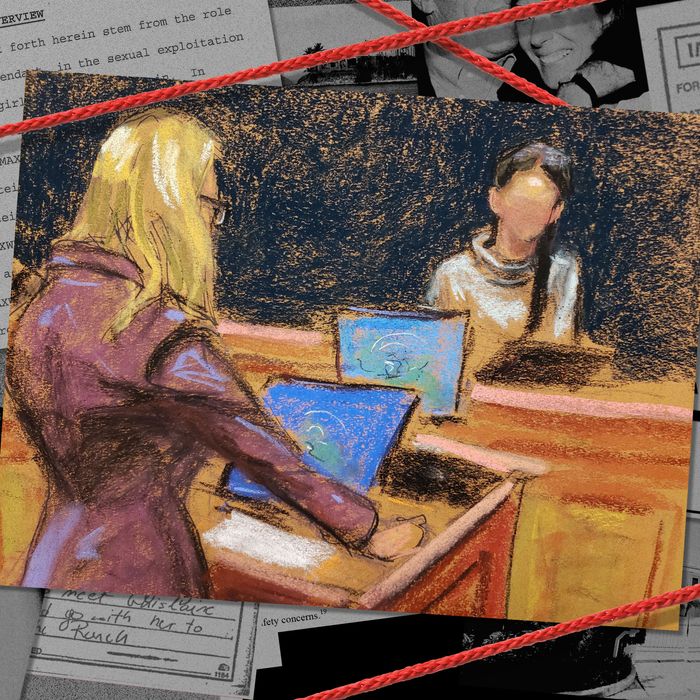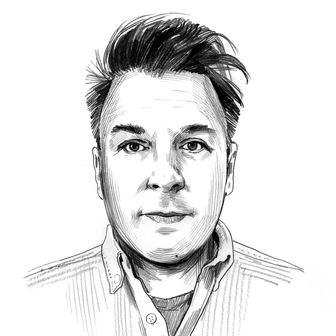
There are a million ways to say “I don’t recall.” The woman we call “Jane” has the astounding voice of a trained professional. She speaks in rich ranges, from just-consumed-bitter-coffee to vloggy uptalk, always showing off her instrument. Jeffrey Epstein may have paid for some of the schooling of that voice, but the gift is all hers. If you ever have been around master vocalists, they all have a unique presence created by their voice, with all kinds of hisses and complex overtones, mysterious and sometimes scary sonic things happening under the hood. In their back-and-forths with Jane in court this week, the sounds the lawyers emitted were like cardboard-cutout cartoon bubbles falling face-first in a puff of dust, while Jane sounded like a stormy breeze rolling down through that Microsoft screensaver with the vivid green hill and the bright-blue cloud-swept sky.
“Jane” was the first of the four women we expect to testify in support of the government’s case against Ghislaine Maxwell. She spoke for quite a while; what you will want to know is that she said she was first sexually abused by Epstein at 14, that Maxwell was in the room more than twice when Epstein abused her, and that she was instructed by Maxwell on how to give massages to Epstein.
In response, Maxwell’s attorneys used material gathered by FBI investigators in interviews from 2019 to 2021, intending to contradict anything and everything Jane said — “Misremembering details, misremembering where she lived, not being able to recognize a house, that all goes to her credibility as a witness, her believability,” is how Christian Everdell, a lawyer for Maxwell, explained it to the judge; then he said something preposterous: “Her memory of every single detail of her childhood is central to the case.”
The “I don’t recalls” from Jane began in response to a sea of questions stemming from those prior statements to the government. At first, this felt like a devastating pummeling; the defense did make Jane look like she had been inconsistent over the years. The Broadway opening year of The Lion King, in her memory of every single detail of her childhood, was off by three years. At one point, she seemed to be suffering and answered a question about the abuse in a different vocal mode, in a strangled or childlike tone; I absolutely believed everything from her after hearing that. (“When the body undergoes trauma, there are inevitable repercussions for the voice, especially in its capacity as an instrument,” wrote the soprano Lauren McQuistin in an article about the effects of sexual abuse on vocalists in the Journal of Singing.)
Finally, at last, Jane said that what she was being asked to respond to weren’t actually transcripts of her words — they were someone’s typed notes of what Jane had said. She had never seen that text herself, and her account hadn’t even been recorded.
Even so, some observers present in court this week thought Jane’s testimony was bleak for the prosecution. But people, even juries, recognize that we can’t remember the entirety of our teenage years, particularly when we are being serially assaulted.
Maxwell’s team lost its way. The lawyers fumbled down weird roads and never arrived at a destination. The lawyer asking questions later said she was suffering from low blood sugar. Then, for a while, the defense worked on describing Jane as money hungry and after an Epstein payday.
The defense also dwelled for an extremely luxurious amount of time on the fact that Jane works as an actress. “You’re able to cry on command?” she was asked. “No, not always,” Jane said. “It’s not really how it works.”
Then the prosecution brought out a handsome previous boyfriend of hers, calling him “Matt”; he and Jane lived together for six or seven years. She’d told him about Epstein years ago. A government lawyer wondered what Jane’s reaction had been when Matt had asked for details about her dealings with Epstein. Matt responded: “She would just say to me, ‘Matt, the money wasn’t fucking free.’”
Maxwell’s lawyers had no questions for him.
The prosecution will be presenting witnesses against Ghislaine Maxwell until around December 14. That means, given holidays, the trial is unlikely to conclude before January 6, so temper your burgeoning opinions about the outcome accordingly. The lawyers are just starting to find their pacing, finding out what the judge, Alison J. Nathan, will and will not allow. So far, the judge pushes the proceedings forward sturdily; she is more vigorously attentive than your best former therapist; she dampens flare-ups and quietly defuses acerbic moments.
You have to wonder what it’s like for the members of the jury. Before Thanksgiving, they were out moving the car for alternate-side parking night, oversleeping for work, forgetting to take out the trash, finally winding down that affair, complaining about jury duty — the regular stuff we all do every day. Now, they’re locked in an invisible agreement of silence, disappearing each morning into a small timehole of a room, as a parade of people unload horrible details about one of the strangest mysteries of our time.
More From court appearances
- Running From Inside
- Trump Finally Had a Good Day in Court
- Everything to Know About Jennifer Crumbley’s Manslaughter Conviction






























